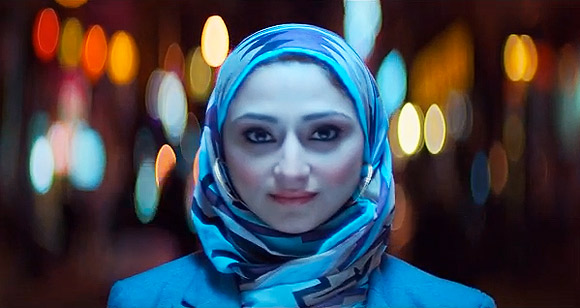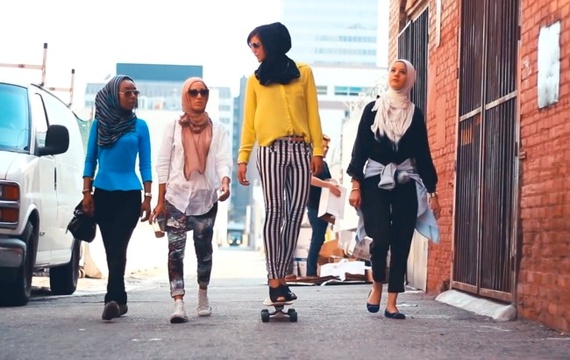(Part of the Hot Spot series “By Any Media Necessary”)
By Yomna Elsayed
This year, Coca Cola aired a 60 second ad during the Super Bowl stirring a controversy that extended far beyond the football game. The commercial ostensibly celebrated America’s diversity in the different languages of American immigrants and featured — to the surprise of many Muslims including myself — a fleeting image of a veiled Muslim woman.  But, perhaps it was the intermingling of neo-liberal for-profit corporate goals with the social cause of acceptance and celebration of diversity that sat uneasy with me, at least until the uproar started. Ironically, the ad that was supposed to celebrate America’s diversity ended up showing the not-so-tolerant side of white conservative America, whereby “America the Beautiful” can and must only be sung in English. That was the time when I decided suppress my anti-corporate cynical take on it. I decided not to speak about it because, irrespective of the double barreled tactics of the company, I do desire a change in media representation of Muslim minorities even if it is a fleeting corporate sponsored representation!
But, perhaps it was the intermingling of neo-liberal for-profit corporate goals with the social cause of acceptance and celebration of diversity that sat uneasy with me, at least until the uproar started. Ironically, the ad that was supposed to celebrate America’s diversity ended up showing the not-so-tolerant side of white conservative America, whereby “America the Beautiful” can and must only be sung in English. That was the time when I decided suppress my anti-corporate cynical take on it. I decided not to speak about it because, irrespective of the double barreled tactics of the company, I do desire a change in media representation of Muslim minorities even if it is a fleeting corporate sponsored representation!
This was not the first time that Muslim inclusion in an ad campaign causes such an uproar. Recently, a company selling anti-snoring products featured a real US-soldier and his face-veiled Muslim wife as an unlikely couple kept together by the anti-snoring product. The ad was described by some as offensive and an insult to the military. Another uproar started when a video titled “Mipsterz: Muslim Hipsters” went viral on the internet. Co-producer Layla Shaikley relates: “I was sick of telling ‘my story.’ Every time I did, I was contending with Islamphobes and terrorists alike, who had equally hijacked the popular narrative about Muslims. So I tried to [do] something else: creative action.” According to Shaikley, the video featured a couple dozen Muslim women in veils “showcasing their fashion sensibilities and having a good time. Whether biking, laughing, or just hanging out, the people in the video were asked to be themselves when they were not shot candidly”. The subjects in the video ranged from “an Olympian fencer to a Harvard Dental School student to an attorney” to herself.
Unsurprisingly, Mipsterz too sparked debate, but not only among the American mainstream who were the main target of the video, but also among the Muslim community itself. According to Shaikley, who was surprised by the uproar, “[r]eactions ranged from awesome to objectifying, from liberating to professionally hot, from saying we were proudly American to accusing us of stripping ourselves of authentic Eastern substance, from inclusive to fat-shaming, from shattering stereotypes to perpetuating new ones.” The video was criticized for representing only a sub-section of Muslim women, for focusing on fashion and a Western lifestyle, and for not representing all socioeconomic classes (Shaikley, 2014, Chaudry, 2014). The questions of who represents what and how were raised by the same under-represented Muslim minority complaining of lack of representation. According to Rabia Chaudry, the video was accused of being “too American!” The work was not merely received as a subjective work of art – as a personal story of the lives of some Muslim women “somewhere in America” – but was overburdened with the onus of representing Islam, Muslims and Muslim women from every racial and socioeconomic class (Chaudry, 2014).
However, the question remains as to how effective such ads and videos are in changing long-held convictions and attitudes? Aren’t they merely a superficial representations that would collapse at the first remembrance of the September 11th events —in which Muslims and Christians alike were victims to a terrorist mentality capable of turning any religious text into war-sanctioning decrees? Is TV representation enough to alter a status quo or is it a mere reflection of that status quo? Can we say that the media representation of African Americans changed attitudes about racism in society? According to a Topos Partnership report on black males’ media representations, “[d]espite the widely held idea that racism has become socially unacceptable, large percentages of the population harbor very traditional prejudiced views in which Black males tend more than non-blacks toward violence, criminality, irresponsibility, hypersexuality, and so on” (p. 31). So, on whose shoulders lay the responsibility of altering the status quo?
The trouble with representations lies in the fact that they will never be immaculate and will never please everyone. They are usually subjective cross-sections of the lives of those who could afford to tell their stories through monetary or technical resources. Nonetheless, they are necessary in enabling underrepresented minorities to enter into a nation’s stream of consciousness. What is common between most cases of discrimination and stereotyping (at least in their beginnings) is that they are simply not talked about. The silence is what perpetuates isolated incidents into phenomena. These videos, on the other hand, force issues of silent discrimination and stereotyping into discussion. They materialize isolated incoherent debates or complaints into shared objects that we can agree with or criticize. When a debate ensues, individuals are driven to question the reasons for why they hold certain beliefs, to question the reason for their silence and whether they should be silent anymore. They may even be tempted to produce their own versions and represent their stories the way they see them. Perhaps the story is more spiritual and less hip than Mipsterz’ fashionable headscarves and skateboards. What is important is that the debate goes on, by any means necessary. I say this with complete faith as I glance over my precious red Coke bottle that I unwittingly purchased while humming America!
Sources
Layla Shaikley. The Surprising Lessons of the ‘Muslim Hipsters’ Backlash. The Atlantic (March 13th, 2014). http://www.theatlantic.com/entertainment/archive/2014/03/the-surprising-lessons-of-the-muslim-hipsters-backlash/284298/
Rabia Chaudry. Somewhere on the Internet Muslim Women are being Shamed. altmuslim (December, 3rd, 2013) http://www.patheos.com/blogs/altmuslim/2013/12/somewhere-on-the-internet-muslim-women-are-being-shamed/



Speak Your Mind